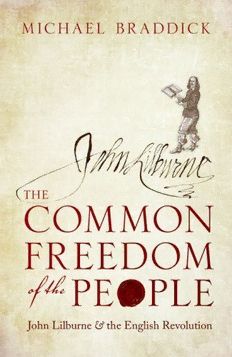
COMMON FREEDOM OF THE PEOPLE: john lilburne and the english revolution PDF
Preview COMMON FREEDOM OF THE PEOPLE: john lilburne and the english revolution
OUP CORRECTED PROOF – FINAL, 29/03/18, SPi THE COMMON FREEDOM OF THE PEOPLE OUP CORRECTED PROOF – FINAL, 29/03/18, SPi OUP CORRECTED PROOF – FINAL, 29/03/18, SPi the COMMON FREEDOM PEOPLE of the John Lilburne & the English Revolution MICH A EL BR A DDICK 1 OUP CORRECTED PROOF – FINAL, 29/03/18, SPi 3 Great Clarendon Street, Oxford, ox2 6dp, United Kingdom Oxford University Press is a department of the University of Oxford. It furthers the University’s objective of excellence in research, scholarship, and education by publishing worldwide. Oxford is a registered trade mark of Oxford University Press in the UK and in certain other countries © Michael Braddick 2018 The moral rights of the author have been asserted First Edition published in 2018 Impression: 1 All rights reserved. No part of this publication may be reproduced, stored in a retrieval system, or transmitted, in any form or by any means, without the prior permission in writing of Oxford University Press, or as expressly permitted by law, by licence, or under terms agreed with the appropriate reprographics rights organization. Enquiries concerning reproduction outside the scope of the above should be sent to the Rights Department, Oxford University Press, at the address above You must not circulate this work in any other form and you must impose this same condition on any acquirer Published in the United States of America by Oxford University Press 198 Madison Avenue, New York, NY 10016, United States of America British Library Cataloguing in Publication Data Data available Library of Congress Control Number: 2017960662 ISBN 978–0–19–880323–2 Printed in Great Britain by Clays Ltd, St Ives plc Links to third party websites are provided by Oxford in good faith and for information only. Oxford disclaims any responsibility for the materials contained in any third party website referenced in this work. OUP CORRECTED PROOF – FINAL, 29/03/18, SPi For Cora and Melissa OUP CORRECTED PROOF – FINAL, 29/03/18, SPi OUP CORRECTED PROOF – FINAL, 29/03/18, SPi [My] great love and respect [are] justly due unto you, for your constant zealous affection to the Common Wealth, and for your undaunted reso- lution in defence of the common freedome of the People William Walwyn to John Lilburne, 1645 Quoted from The Levellers in the English Revolution, ed. G. E. Aylmer (London, 1975), p. 64 OUP CORRECTED PROOF – FINAL, 29/03/18, SPi OUP CORRECTED PROOF – FINAL, 29/03/18, SPi Preface At the heart of this book is a remarkable life. The second son of a modest gentry family in the north-east, John Lilburne was apprenticed to a London woollen merchant in 1632. Through his master’s connections he became involved in opposition to the religious policies of Charles I, and in the pub- lication of dangerous books, leading to a first arrest in 1637. He was eventually to be accused of treason four times, and was on trial for his life three times. Over twenty years he was subjected to brutal physical punishment, harsh prison conditions, and lonely exile, but he also managed to fit in active mili- tary service in the civil war. He fought bravely at a number of the key battles, was shot through the arm, nearly lost an eye in a pike accident, and rose to the rank of lieutenant colonel. Initially in trouble for his opposition to Charles I’s regime, he was subsequently at odds with every government under which he lived. He died in his early forties, having spent the major part of his adult life in prison or exile. In the course of this dramatic life he fought some important legal battles: for the right to remain silent (one of the issues on which he has been cited by US constitutional lawyers) and to an open trial (an issue on which he has been cited in the US Supreme Court), while his argument that juries were judges of law as well as of fact long outlived him. He made ample use of habeas corpus, and his example became central to the image of the freeborn Englishman of the eighteenth and nineteenth centuries.1 Most strikingly of all, he was closely associated with the Leveller-led campaign for a written constitution, an Agreement of the People, which would have established a gov- ernment answerable to the will of the people two centuries before the advent of mass representative democracy in Europe. This was a remarkably courageous career, but the strength of character on which it drew made Lilburne an unreliable friend. It was Oliver Cromwell, in his first recorded parliamentary speech, who called for Lilburne’s release from imprisonment imposed by Charles I’s regime. Yet Lilburne was also tried for treason in the first year of republican rule, and Cromwell was probably
